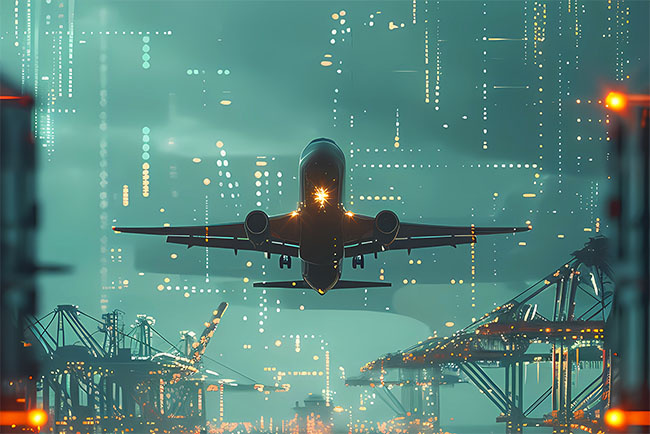The aviation industry is evolving rapidly, with Artificial Intelligence (AI) and automation becoming key drivers of transformation. Airlines around the world are leveraging these technologies to streamline operations, improve efficiency, and enhance the overall passenger experience. In this blog, we explore how AI and automation are revolutionizing the aviation industry and what it means for both airlines and passengers.
How AI and Automation Are Enhancing Airline Operations
AI and automation technologies are now embedded in various facets of airline operations, from ground handling to in-flight services. Here’s a closer look at their impact:
- Predictive Maintenance
One of the most significant contributions of AI in airline operations is predictive maintenance. AI algorithms analyze real-time data from sensors embedded in aircraft, identifying patterns that predict potential equipment failures before they happen. This allows airlines to schedule maintenance proactively, reducing downtime and improving safety. According to research from Deloitte, predictive maintenance can reduce maintenance costs by up to 20% and cut downtime by 50%. - Optimized Flight Scheduling
AI is revolutionizing flight scheduling by using data-driven algorithms to optimize routes, departure times, and crew rotations. These algorithms factor in variables such as weather conditions, air traffic, and fuel efficiency to create the most cost-effective and time-efficient schedules. The result? Reduced delays, improved fuel efficiency, and more punctual flights. - Fuel Efficiency and Environmental Impact
AI-powered tools help airlines minimize fuel consumption by providing real-time route optimization. This not only helps reduce operational costs but also contributes to lowering the airline’s carbon footprint. Tools like SkyBreathe, a fuel-efficiency software used by Air France and other major airlines, enable operators to analyze data from each flight and suggest fuel-saving techniques. - Dynamic Pricing Models
AI-driven dynamic pricing algorithms allow airlines to adjust ticket prices in real-time based on demand, competition, and booking trends. This ensures airlines maximize revenue while offering competitive prices to passengers. Companies like Skyscanner and Google Flights use AI to track price changes, helping consumers find the best deals.
Enhancing Passenger Experience Through AI and Automation
Beyond operational improvements, AI and automation are making significant strides in enhancing the passenger experience, ensuring smoother journeys from booking to arrival.
- Personalized Travel Experiences
AI enables airlines to offer highly personalized travel experiences. Through data analysis of customer behavior, preferences, and purchase history, airlines can tailor recommendations for flights, accommodations, and even in-flight services. Lufthansa has implemented AI to provide personalized offers for its passengers, while KLM uses AI chatbots to assist customers with real-time flight information and bookings. - Automated Check-In and Boarding
Airports are increasingly relying on AI-driven automation for check-in, boarding, and security processes. Facial recognition systems expedite boarding and reduce wait times, while self-service kiosks allow passengers to check in without human assistance. Airports like Singapore Changi and Los Angeles International Airport (LAX) have adopted automated biometric systems, speeding up security screenings and reducing congestion. - Virtual Assistants and Chatbots
AI-powered virtual assistants, such as Delta’s Fly Delta App or KLM’s BlueBot, are becoming common tools for travelers. These virtual assistants can answer questions about flight status, baggage handling, gate changes, and even help rebook flights when delays occur. The immediate and accurate responses these chatbots provide improve customer satisfaction by reducing the need for in-person assistance. - Real-Time Language Translation
Airlines are increasingly adopting real-time translation tools to enhance communication with passengers from diverse linguistic backgrounds. AI-powered apps like Google Translate and in-flight entertainment systems equipped with translation capabilities enable passengers and crew to communicate seamlessly, improving the overall travel experience. - Baggage Handling and Tracking
Automation has significantly improved the efficiency of baggage handling systems. AI-driven smart luggage tags and RFID tracking systems allow passengers to monitor their baggage in real-time from check-in to arrival. Airlines such as Delta and Emirates use RFID technology to provide passengers with live updates on the status of their luggage, reducing lost baggage incidents and enhancing passenger trust.
Challenges and Future Outlook
While AI and automation offer significant advantages, they also pose challenges, such as data privacy concerns and the need for seamless integration with existing systems. Airlines must ensure they follow GDPR and other data protection regulations when handling passenger data to maintain trust and compliance.
Looking ahead, the role of AI and automation in aviation will only grow. Emerging technologies like autonomous aircraft, AI-powered air traffic control, and smart airports will further revolutionize the industry. As AI continues to learn from vast amounts of data, it will offer even more advanced solutions, optimizing every facet of air travel.
AI and automation are transforming both airline operations and passenger experiences, leading to more efficient flights, personalized services, and seamless travel experiences. From predictive maintenance to dynamic pricing, AI is revolutionizing the way airlines operate. Passengers are also benefiting from these advancements, with faster check-ins, improved baggage tracking, and personalized in-flight services.
At VortexJet, we believe in leveraging the latest AI and automation technologies to provide our clients with exceptional aviation services. Stay ahead in the ever-evolving aviation industry by embracing the power of AI and automation for your airline operations.

